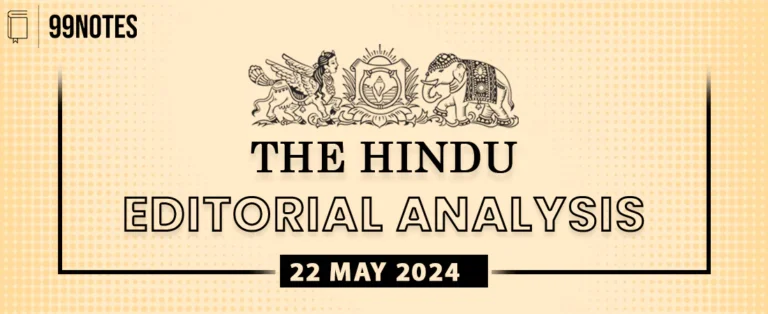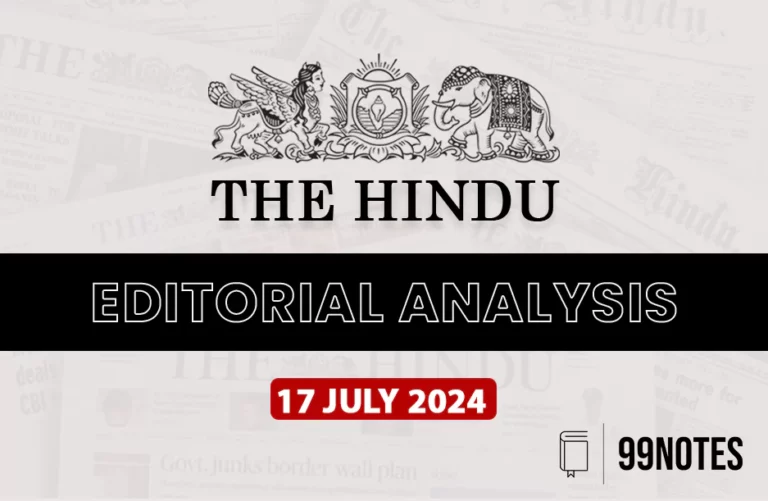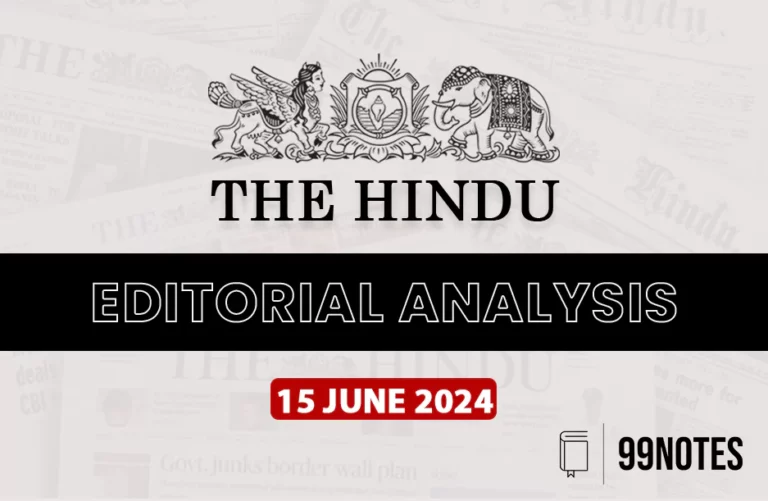29 April 2023 : The Hindu Editorial
The women’s Reservation Bill cannot wait anymore.
Topic: GS1: Women & Women organizations
Previous year questions on Women:
- What are the continued challenges for women in India against time and space? (UPSC CSE(M) 2019)
- The women’s questions arose in modern India as a part of the 19th century social reform movement. What are the major issues and debates concerning women in that period? (UPSC CSE(M) 2017)
Context:
- India should recognise the crucial role that women can play in the development and progress of the nation, given the abundant proof of women leaders making significant contributions.
- Despite the progress made by women in different sectors, politics remains an area where women have to overcome numerous challenges to succeed.
- Even after 75 years of Independence, women hold only 14% of the seats in Parliament.
- This lack of representation clearly indicates the systematic exclusion of women from politics.
Background of Women reservation:
- The demand for women’s reservations in politics in India originated from pre-Independence times.
- In 1955, a committee recommended that 10% of the Lok Sabha and State legislative assemblies be reserved for women.
- However, it was in the 1980s that the demand for women’s reservations gained momentum.
- In 1988, the National Perspective Plan for Women recommended reserving 30% of seats in all elected bodies for women.
- This recommendation was also mentioned in the National Policy for the Empowerment of Women, adopted in 2001.
- In 1993, the Panchayati Raj Act was amended to reserve 33% of seats in local government bodies for women.
- This reservation was a significant step towards women’s political empowerment and led to demands for similar reservations in other elected bodies.
- In 1996, the Women’s Reservation Bill was introduced in the Lok Sabha, proposing to reserve one-third of seats in the Lok Sabha and State Legislative Assemblies for women.
- The Bill lapsed due to strong opposition from some political parties.
- Global examples: Women leaders excel globally, especially in countries with policies supporting gender equality. Female-led countries have the best governance practices. For example, Rwanda’s female leadership has helped heal the genocide’s scars and bring social reforms.
Significance of women’s reservation in politics:
- Women’s reservation in politics ensures equal access to political representation and decision-making power.
- Women’s perspectives and experiences are essential in shaping policies and governance practices.
- With adequate representation, women’s issues and concerns may be addressed.
- Women’s reservation in politics promotes gender equality and women’s empowerment.
- Women in political leadership positions positively impact policies and governance practices.
- Studies have shown that women in political leadership positions lead to better outcomes for everyone.
Challenges to women’s reservation in politics:
- Patriarchal attitudes and gender stereotypes limit women’s opportunities and potential in politics.
- Resistance from male politicians and political parties may view women’s representation as threatening their power.
- Women candidates lack support and resources, including funding, training, and networks.
- Cultural and societal norms discourage women’s participation in politics, such as expectations of women’s primary roles as caretakers of the home and family.
- Inadequate implementation and enforcement of women’s reservation policies, including failure to ensure compliance with reservation quotas and lack of penalties for non-compliance.
Way forward:
- Implementing women’s reservation in legislative bodies, as proposed in the Women’s Reservation Bill.
- Encouraging and supporting women to run for political office through mentorship programs, training, and financial assistance.
- Increasing awareness about the importance of women’s political participation through campaigns, media, and education.
- Addressing the barriers that prevent women from participating in politics, such as social and cultural norms, lack of access to resources, and gender-based discrimination.
- Providing a supportive and inclusive political environment that values women’s contributions and perspectives.
- Encouraging political parties to nominate more women as candidates for elections.
- Increasing representation of women in leadership positions in political parties.
- Addressing the issue of violence against women in politics, which is a significant barrier to women’s participation.
Delay in conveying a decision on assent to Bills is constitutionally impermissible.
Topic: GS2 – Indian polity – Federalism
Previous year questions on Federalism:
- How far do you think cooperation, competition and confrontation have shaped the nature of federation in India? Cite some recent examples to validate your answer. (UPSC CSE(M) 2020, 150 words)
- Discuss the essential of the 69th Constitutional Amendment Act and anomalies, if any, that have led to recent reported conflicts between the elected representatives and the institution of the Lieutenant Governor in the administration of Delhi. Do you think that this will give rise to a new trend in the functioning of the Indian federal politics? (UPSC CSE(M) 2016, 200 words)
Issue:
- The Supreme Court has reminded Governors of their constitutional duty to return a Bill to the State Assembly for reconsideration “as soon as possible”.
- The Court observed that the phrase “as soon as possible” contains significant constitutional content and must be considered by constitutional authorities.
- It is constitutionally impermissible for Governors to hold on to Bills indefinitely without communicating their decision to the House.
- The power to withhold consent or return a Bill for reconsideration is seen as discretionary. Still, in the Constituent Assembly, it was clarified that returning a Bill was to be done only on advice.
Constitutional provisions:
- Article 200 of the Indian Constitution : It allows the Governor to withhold their consent and to return the Bill to the State Legislature for reconsideration.
- First provision to Article 200 mandates that the Governor return the Bill for reconsideration “as soon as possible”.
- Article 201 : It allows the Governor to reserve any Bill for the consideration of the President.
- Article 163 states that the Governor shall act on the ‘aid and advice’ of the Council of Ministers, except in certain specified matters.
- The Constitution of India also provides the Governor with discretionary powers to act on their judgment in certain circumstances.
The growing problem of substance abuse in J&K.
Topic: GS1: Indian Society.
GS3: Issues related to Security
Previous year Questions on Jammu & Kashmir
- The banning of ‘Jamaat-e-Islami’ in Jammu and Kashmir brought into focus the role of over-ground workers (OGWs) in assisting terrorist organizations. Examine the role played by OGWs in assisting terrorist organizations in insurgency affected areas. Discuss measures to neutralize the influence of OGWs. (UPSC CSE(M) 2019)
Context:
- There has been increased evidence of the growing substance abuse problem in Jammu and Kashmir.
- This increases several problems ranging from threats to social fabric – internal/external Security of India.
Reasons for substance abuse:
- Psychological factors: Mental health disorders such as anxiety, depression, and trauma can contribute to substance abuse as individuals turn to drugs or alcohol as a coping mechanism.
- Social and environmental factors: Peer pressure, exposure to drug or alcohol use, and a lack of support or guidance from family and friends can also contribute to substance abuse.
- Physical factors: Chronic pain or other physical ailments can lead individuals to use prescription painkillers or other drugs to manage their symptoms.
- A family history of substance abuse can increase the risk of an individual developing a substance use disorder.
Issues associated with substance abuse:
- Health problems: Substance abuse can lead to many health problems – including addiction, heart disease, cancer, and mental health disorders such as anxiety and depression.
- Economic impact: Substance abuse can significantly burden the economy due to increased healthcare costs, lost productivity, and increased crime rates.
- Crime: Substance abuse can increase criminal activity, including drug-related and violent crimes.
- Family problems: Substance abuse can tear families apart and lead to various issues, including domestic violence, child abuse, and neglect.
- Social issues: Substance abuse can lead to social problems such as homelessness, unemployment, and poverty.
- Erosion of morality: It can also contribute to the breakdown of communities and the decline of social values.
- Concerns regarding national Security: Drug trafficking is a significant funding source for terrorism and other transnational criminal activities. India shares borders with several major drug-producing countries, such as Afghanistan and Myanmar – which makes it vulnerable to drug trafficking.
Way forward:
- Prevention : This includes education and awareness programs for the youth and the general public about the dangers of substance abuse.
- Treatment: This includes providing access to quality treatment and rehabilitation programs for those struggling with substance abuse.
- Law enforcement: This includes cracking down on the production, distribution, and sale of illegal drugs.
- Socio-economic development: This includes addressing the social and economic factors contributing to substance abuse, such as poverty, unemployment, and lack of education.
- International cooperation: This includes working with other countries to prevent the global spread of illegal drugs and drug trafficking and sharing information and resources to combat drug-related crime and violence.
U.S. – South Korea cooperation agreement – Washington Declaration
Topic: GS2 – International relations
No Questions have been asked on Korea in recent years.
Issue:
- On the 70th anniversary of the U.S.-South Korea alliance, the two countries signed the “Washington Declaration” to protect the Korean Peninsula from a nuclear attack by North Korea.
- Under the new pact – U.S. strategic assets will be deployed around the Korean Peninsula.
- A joint Nuclear Consultative Group will coordinate military responses to any potentially hostile actions by North Korea.
- The U.S. administration will send nuclear-armed submarines to the region for extended deterrence against North Korea, though they are unlikely to be permanently deployed.
- The U.S. will remain the sole authority deciding whether or not to carry out a nuclear response in case of a nuclear attack by North Korea.






